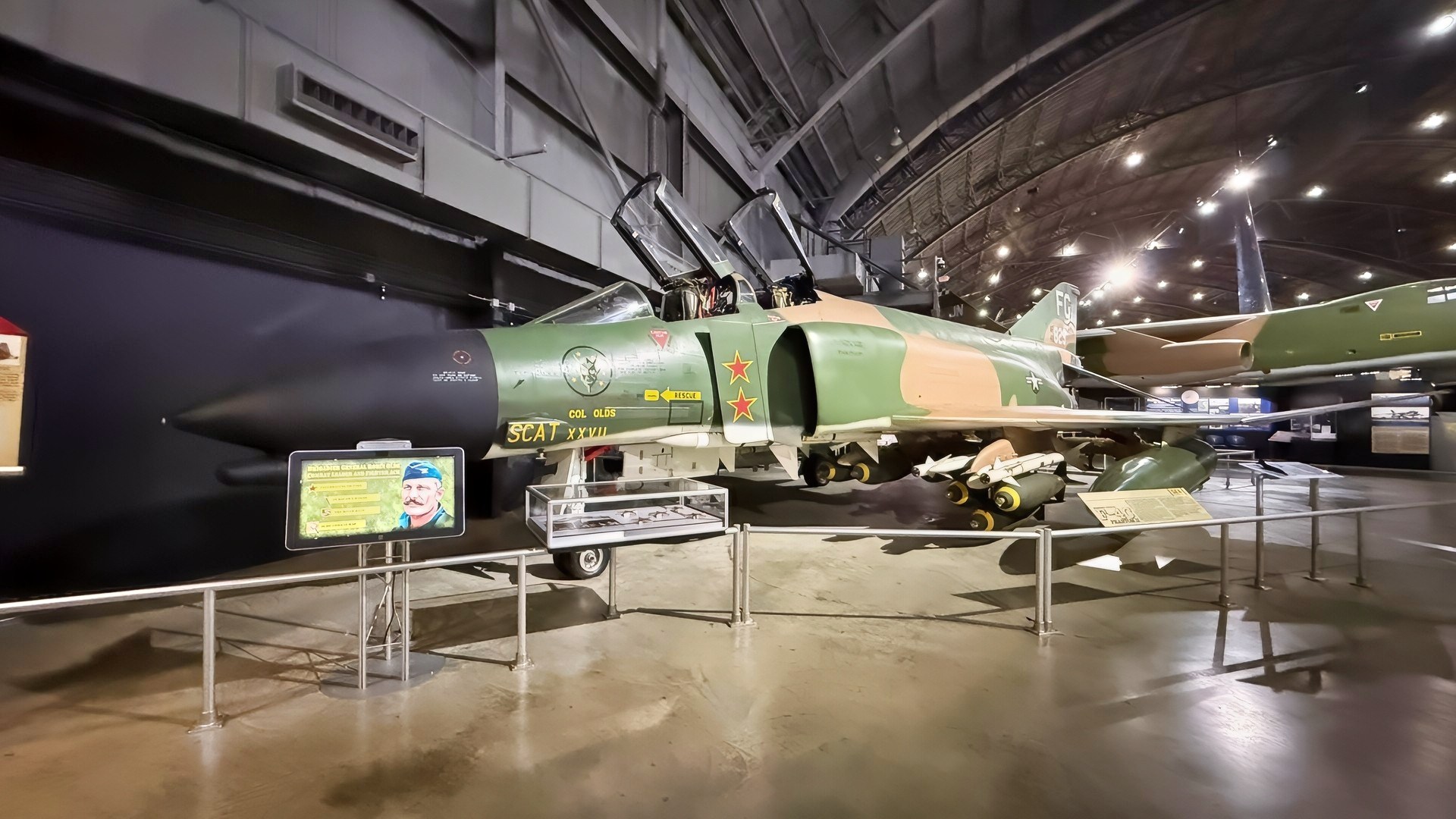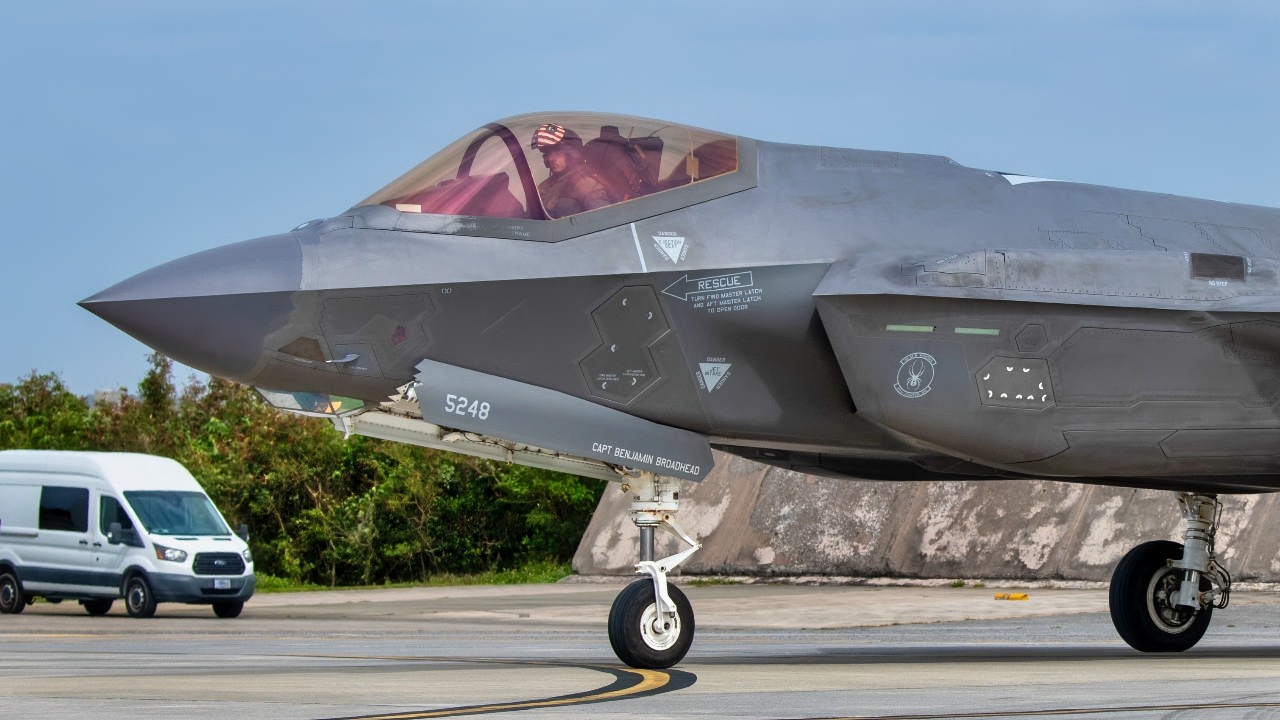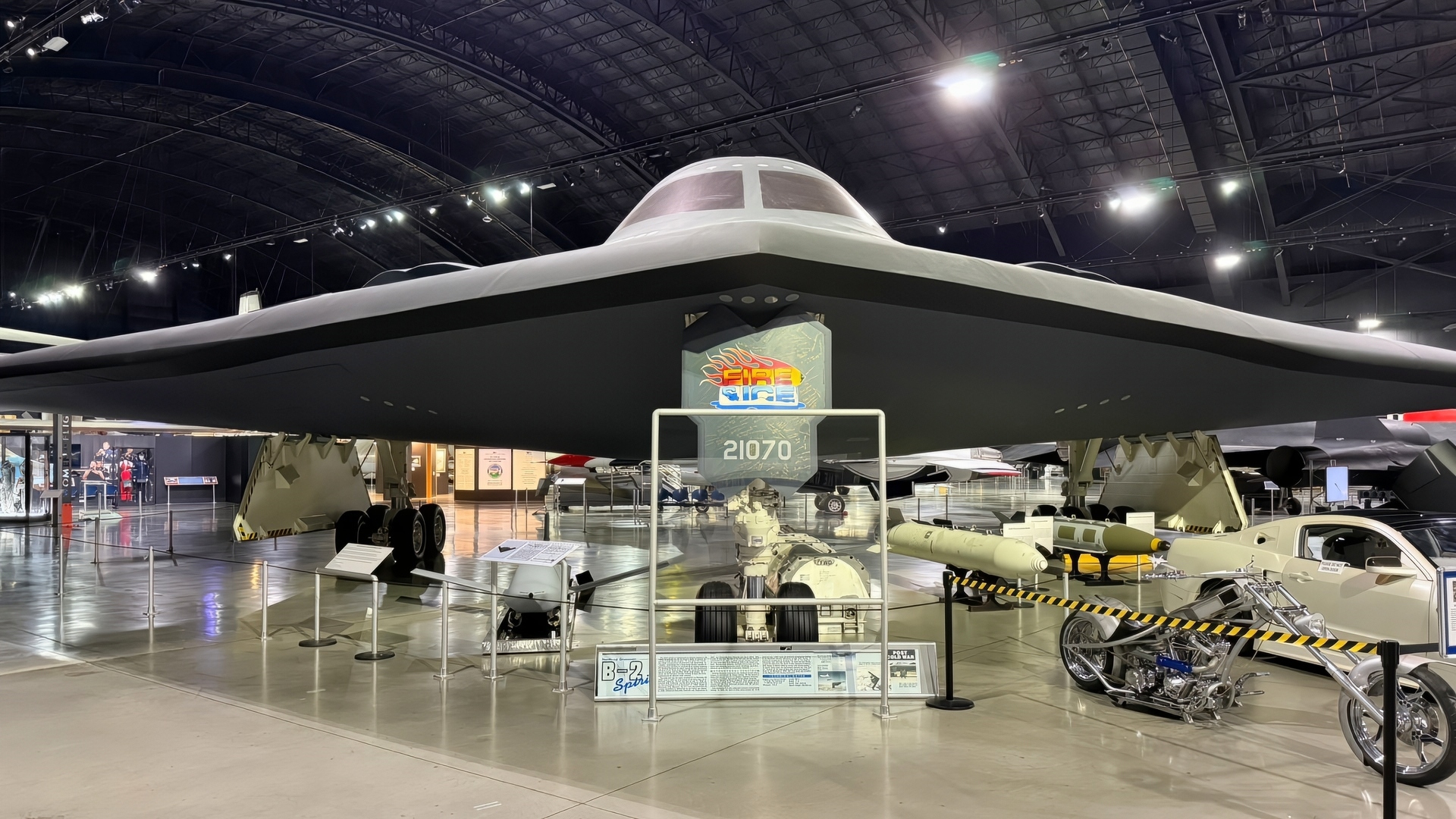Key Points and Summary – Expert Reuben F. Johnson pairs a personal story of a lost naval aviator with the F-35’s combat debut as both “tip of the spear” and “tail-end Charlie” over Iran.
-During Operation Midnight Hammer, F-35s escorted B-2 bombers hundreds of miles into Iranian airspace, then loitered to hunt surface-to-air missile sites and cover the raid’s egress — the most vulnerable phase of any strike.

A U.S. Air Force F-35A Lightning II assigned to the 60th Fighter Squadron, flies overhead after conducting a live weapons drop at Camp Shelby, Miss., Oct 25, 2023. During the exercise, pilots tested various munitions including the GBU-12s, GBU-31v1s, and 362 rounds of 25mm Training Munitions from the gun.
-Unlike Vietnam-era F-4 crews, these pilots relied on stealth, sensor fusion, and precision weapons to ensure no enemy fighter or SAM ever got a clean shot, validating years of promises about the Lightning II in one high-risk mission.
F-35: “Tip of the Spear” and “Tail-End Charlie” in the Same Iran Raid
SEOUL, SOUTH KOREA – More than 25 years ago, I lost a long-time friend and colleague to a tragic accident. Like many other naval aviators, he continued to fly fighters even after retiring from active duty.
One evening, he was scheduled to take off in a jet fighter for a special mission he had been contracted to fly. That night, we had a long phone conversation about the next day’s flight plan.
There were questions about what was doable, within safety limits, etc. I rang off, attempting to convince myself that there was no more than the usual level of danger involved, but with some nagging concerns in the back of my mind.

F-4 Phantom II from U.S. Air Force Museum July 2025. Image Credit: National Security Journal.
The next day, I received the news that anyone who has been around the combat aircraft world regrets. My friend took off as agreed under the flight plan. And he never came back.
There was almost nothing left of him to bury. When an aeroplane comes apart while travelling supersonic, it mostly disintegrates – along with the body of whoever is in the cockpit. For weeks after, I rang his voicemail to listen to his pre-recorded greeting before I was supposed to “leave a message after the beep.”
It was the only way I was going to hear him speak ever again.
His story comes to mind almost every year at this festive time, when we will ring up old friends we have not seen in a while. But I also thought of him today when I read a story about how US F-35 fighter aircraft participated this past June in the Operation Midnight Hammer attack on Iran’s nuclear facilities.
The F-35s that were part of that raid flew deep into its airspace to escort the US Air Force (USAF) B-2 stealth bombers that struck the Iranian underground bunkers where Iran was assessed to have been working on developing a nuclear weapon.
The F-35s then flew combat air patrol (CAP) over the strike zone before covering the mission’s egress once the bombers had dropped their weaponry, then turned back towards their home base. The single-engine stealth fighters were the first into the fight and the last to depart.

An F-35A Lightning II assigned to the 4th Fighter Squadron, Hill Air Force Base, Utah, taxis into position in front of two U.S. Air Force Airmen with the 18th Logistics Readiness Squadron for forward area refueling point operations during a FARP demonstration at Kadena Air Base, Japan, Feb. 14, 2024. FARP allows operators to transfer fuel from one aircraft to another; this process enables fighter aircraft to land, refuel or re-arm before returning to air-battle operations rapidly in contested environments. (U.S. Air Force photo by Airman 1st Class Jonathan R. Sifuentes)
Being “Tail-End Charlie”
All of which means that the F-35s were the proverbial “tip of the spear” by entering the strike zone before any other aircraft. It can be dangerous, but the first fighter that comes into the range of any enemy radars or interceptors usually also has the element of surprise in his favor.
It is the part about being the last aircraft to leave the zone, the “tail-end Charlie” of a mission involving a major bombing run and a large number of aircraft, that carries the dangerous element.
By the time these F-35s left the airspace where the B-2 attack had taken place, there was no more element of surprise. Any air defense units or enemy fighters would have known the F-35s’ altitude, course, and speed, and would have been homing in on them.

B-2A Spirit On Display. Image by Editor Harry J. Kazianis/National Security Journal.
Being in the tail-end Charlie position is thus one of the more dangerous spots to be in during such a raid.
My departed friend had been in that position more than 55 years ago after launching off the carrier on a night raid over Hanoi during the Vietnam War.
I will not go into all the details here, but what happened that night was that, as he covered the mission egress, he found himself with an enemy fighter aircraft right on his tail. It was the first time he had heard his rear-seater Weapons Systems Officer (WSO) screaming, “There is a MiG on our Six,” blaring through his headphones.
“The combination of the shock, fear and adrenaline were so much that I embarrassingly almost departed the aircraft,” he related to me many years after the incident took place. “One of those moments when you hope no one is around to see what happened,” he said.
Why No One Ever Touched Them
Needless to say, there is a vast difference in the radar cross section (RCS) between the old McDonnell-Douglas F-4 that the US Navy flew off carriers during the Vietnam War and today’s F-35. Commanders involved in Operation Midnight Hammer recently shared details of the mission and how it validated the F-35’s capabilities.
“We flew hundreds of miles into Iran, escorting the B-2s the entire way,” Lt. Col. Aaron Osborne, who is commander of the 34th Fighter Squadron, recalled in a US Air Force story.
“We employed weapons to great effect against multiple surface-to-air missile sites,” as he also recalled how the F-35s “plowed a path” through the SAM coverage for the B-2s.

An F-35 Lightning II from the 115th Fighter Wing flies alongside a KC-135 Stratotanker with the 121st Air Refueling Wing after being refueled over the skies of Wisconsin, March 20, 2024. The F-35 II’s aerodynamic performance and advanced integrated avionics will provide next-generation stealth, enhanced situational awareness, and reduced vulnerability for the United States and allied nations. (U.S. Air National Guard photo by Senior Airman Ivy Thomas)
The F-35 has had more than its share of problems since entering service, but on this occasion, the aircraft proved its combat effectiveness. Not the least of this proof is that there were no enemy aircraft to surprise those at the tail of the mission flight by pulling up behind them in a perfect firing position.
“The effectiveness of this strike validated all of the capabilities of the F-35 we’ve been talking about for years — stealth, lethality, sensor-fusion, being a force multiplier,” said Col. Charles Fallon, 388th Fighter Wing commander. The operation was counting on the F-35 pilots and the aircraft to both perform to specifications, “and both proved more than capable.”
It was a mission my late friend, I am sure, would have loved to have played a part in.
About the Author: Reuben F. Johnson
Reuben F. Johnson has thirty-six years of experience analyzing and reporting on foreign weapons systems, defense technologies, and international arms export policy. Johnson is the Director of Research at the Casimir Pulaski Foundation. He is also a survivor of the Russian invasion of Ukraine in February 2022. He worked for years in the American defense industry as a foreign technology analyst and later as a consultant for the U.S. Department of Defense, the Departments of the Navy and Air Force, and the governments of the United Kingdom and Australia. In 2022-2023, he won two awards in a row for his defense reporting. He holds a bachelor’s degree from DePauw University and a master’s degree from Miami University in Ohio, specializing in Soviet and Russian studies. He lives in Warsaw.
More Military
Montana-Class vs. Yamato-Class: It Would Have Been the Ultimate Battleship Battle
The Littoral Combat Ship Might Be the Navy’s Biggest Mistake Ever










